
Asterias is a genus of the Asteriidae family of sea stars. It includes several of the best-known species of sea stars, including the (Atlantic) common starfish, Asterias rubens, and the northern Pacific seastar, Asterias amurensis. The genus contains a total of eight species in all. All species have five arms and are native to shallow oceanic areas of cold to temperate parts of the Holarctic. These starfish have planktonic larvae. Asterias amurensis is an invasive species in Australia and can in some years become a pest in the Japanese mariculture industry.
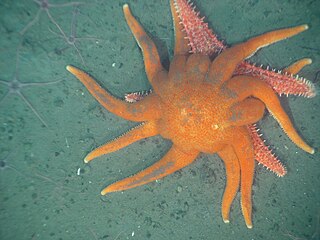
The Valvatida are an order of starfish in the class Asteroidea, which contains 695 species in 172 genera in 17 families.

The Echinasteridae are a family of starfish in the monotypic order Spinulosida. The family includes eight genera and about 133 species found on the seabed in various habitats around the world.

The Asterinidae are a large family of sea stars in the order Valvatida.

Astropecten is a genus of sea stars of the family Astropectinidae.

The Asteriidae are a diverse family of Asteroidea in the order Forcipulatida. It is one of three families in the order Forcipulatida.

Coscinasterias is a genus of sea stars of the family Asteriidae.
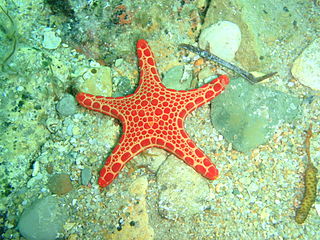
Goniasteridae constitute the largest family of sea stars, included in the order Valvatida. They are mostly deep-dwelling species, but the family also include several colorful shallow tropical species.
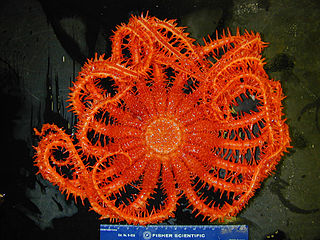
The Brisingids are deep-sea-dwelling starfish in the order Brisingida.

Henricia is a large genus of slender-armed sea stars belonging to the family Echinasteridae. It contains about fifty species.
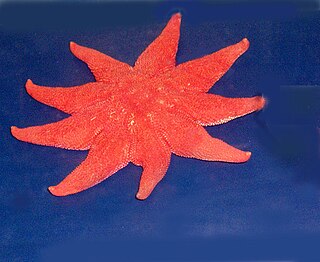
Solaster is a genus of sea stars in the family Solasteridae.

The Brisingidae are a family of starfish found only in the deep sea. They inhabit both the Atlantic and Pacific Oceans at abyssal depths, and also occur in the Southern Ocean and around Antarctica at slightly shallower depths.

Mediaster is a genus of starfish in the family Goniasteridae. It was circumscribed in 1857 by William Stimpson for M. aequalis, the genus's type species. Its junior synonym is the genus Isaster, which was circumscribed in 1894 by Addison Emery Verrill for the species now known as M. bairdi. Verrill himself synonymized the two genus names in 1899.

Pteraster is a genus of sea stars in the family Pterasteridae.
Brisinga is a genus of starfish in the family Brisingidae. The species in this genus are primarily found in deep sea habitats.

Freyella is a genus of deep-sea-dwelling starfish in the order Brisingida.

Freyella elegans is a species of deep-water starfish in the family Freyellidae in the order Brisingida, living at abyssal depths in the northwestern Atlantic Ocean.
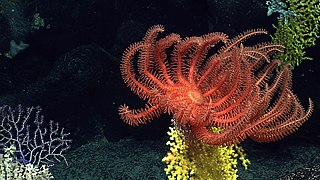
Novodinia is a genus of echinoderms belonging to the family Brisingidae.
Ophidiaster is a genus of echinoderms belonging to the family Ophidiasteridae.

Lophaster is a genus of starfish within the family Solasteridae.
















